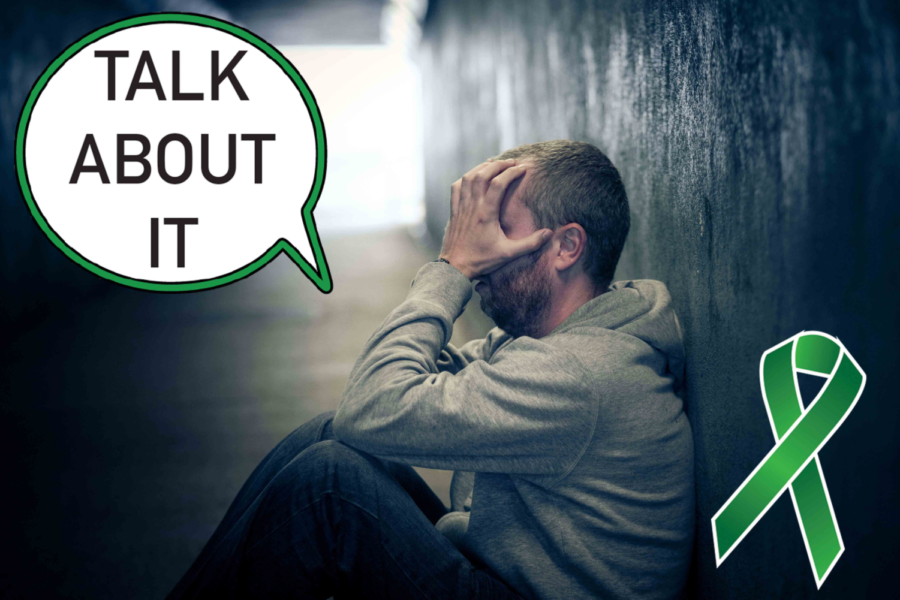Talk About It: Negative coping with mental health issues
Photo courtesy of Getty Images Design by Brooklyn Williams
Negative coping is when someone physically, emotionally or mentally makes an alteration so they can manage or adapt to something that is causing them distress.
November 14, 2019
Editor’s note: This is part seven in our weekly mental health series “Talk About It.” Sensitive content may follow.
If a person is stressed out or experiencing symptoms of trauma or post traumatic stress disorder, they may attempt to deal with their problems through negative ways.
This is called negative coping. To cope is to make a specific alteration physically, emotionally or mentally so the person can manage or adapt to something that is causing them distress.
“A coping mechanism is any behavior or even a thought that you use to reduce anxiety or depression or stress or any bad feeling,” said Monica Marsee, associate professor of psychology.
There are different ways people negatively cope with their mental health issues, which include but are not limited to substance use, avoidance and risky behavior.
“Negatively coping with issues is a lot easier,” Marsee said. “It is more immediate gratification. I could go to a therapist and talk about my depression symptoms, or I could just go to a bar and that would make them go away instantaneously. They would come back even worse because alcohol is a depressant.”
Substance Use, Abuse and Dependence
People may take drugs or drink alcohol to try and feel better. Using drugs and drinking alcohol can be a way for them to avoid the unpleasant thoughts and painful emotions they’re experiencing, which often result in substance abuse and sometimes substance addictions.
“One thing people turn to in order to cope with depression and anxiety is alcohol or other substances,” Marsee said. “It is a pretty common thing; you’ll see those who have depression or anxiety also have substance abuse problems along with that. In order to get rid of that bad feeling, they will use those substances.”
Substance abuse can cause serious problems. Alcohol or using other drugs can put a person’s relationships, job and health at risk.
Marsee said a person is more likely to be angry, depressed or even violent during substance abuse. When under the influence of alcohol or drugs, people often make bad decisions and even worse actions.
When it comes to substance abuse and addiction, there are two types of addiction: physical and psychological, according to spacioustherapy.com.
The physical addiction is the craving and withdrawals.
The psychological addiction is the repeated and learned paired behaviors of using a drug and the temporary reward mechanism of avoidance/escape from the stress, escape from emotional pain and escape from the accompanying thoughts and/or beliefs.
Avoiding Others
Certain social situations may trigger stress, anger or panic attacks, or remind someone of traumatic memories, such as flashbacks.
“Because of these reactions, you may try to avoid doing things with other people,” said Shawna Freshwater, licensed clinical psychologist and neuropsychologist, on her website. “You may even avoid your friends and family.”
Avoiding others can make people feel isolated. Isolation is when someone tends to be alone a lot rather than spending time around other people.
When someone starts to distance themselves from others, their problems can build up. They may have even more negative thoughts and feelings, like sadness and fear. They may also feel as if they’re facing life all alone.
“I think, increasingly, people are going to online resources like social media,” Marsee said. “The reason I might say that is negative is because it isolates the person. It can further isolate someone from social groups or actual interaction, and people can become addicted to looking at the internet and reading social media posts, where the content can be negative and increase depression or anxiety.”
Freshwater gave an example of how to lessen the use of this negative coping mechanism. The example was taking part in social activities, even if one doesn’t feel like it. She said it can help one connect with others, which will help lessen stress.
Avoiding reminders of the trauma
Trying to avoid bad memories or shut out feelings seems understandable and reasonable. However, this avoidance doesn’t work because trauma can control a person’s life if they try to escape from it.
“If you avoid thinking about the trauma or if you avoid seeking help, you may keep distress temporarily suppressed, but at a high cost,” Freshwater said on her website. “It will continue to resurface.”
Avoidance behavior also prevents people from making progress in how they can positively cope with trauma and its consequences.
“People who are anxious tend to use avoidance as a coping skill,” Marsee said. “If they are invited somewhere, they won’t go, or they might not go to class. If they avoid doing that, it can make them feel good in the moment, and that becomes really reinforcing for them and exacerbates the avoidance.”
Risky Behavior
Another way to cope could be by participating in risky or dangerous behaviors. For example, someone may drive too fast or be quick to start a fight when someone upsets them. This could result in the person hurting themself or someone else.
“Certain ways of dealing with stress can be dangerous,” Freshwater said. “If you start smoking or smoke more, you put your health in danger. Emotional eating to relieve stress also can be dangerous.”

















